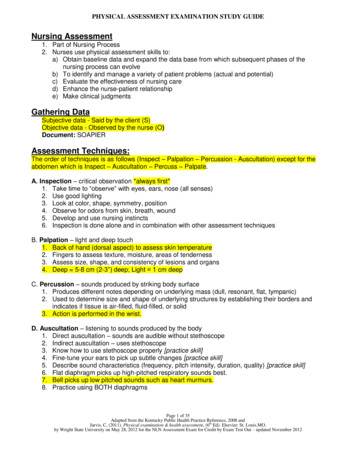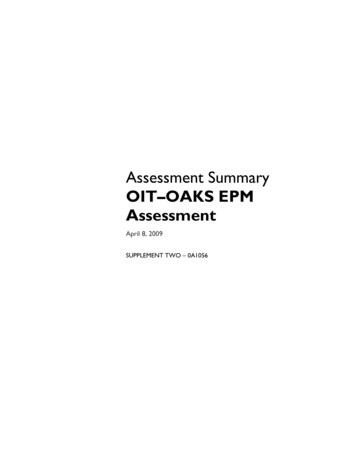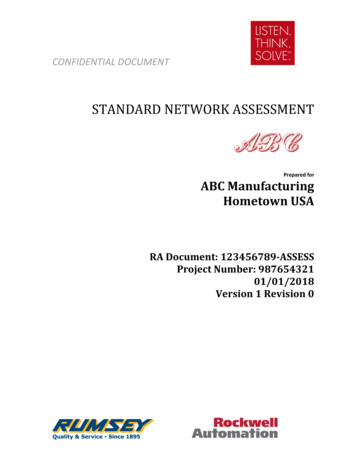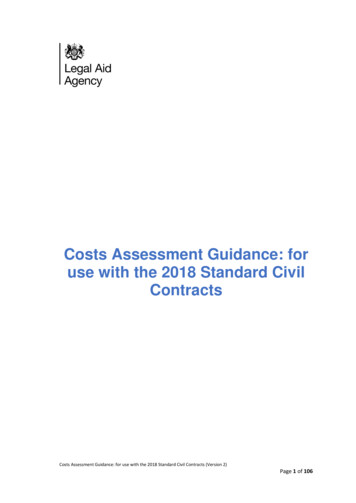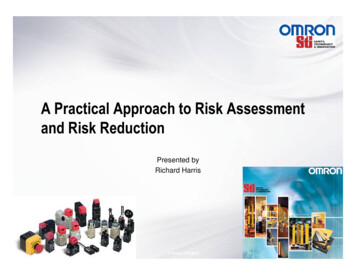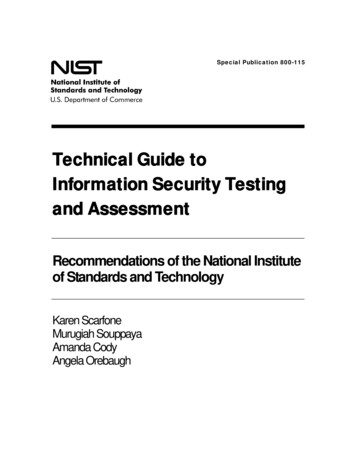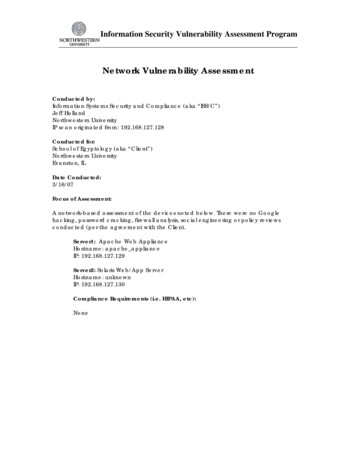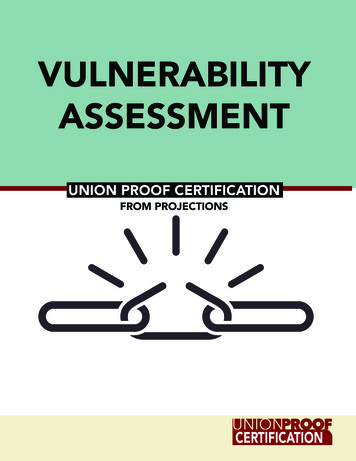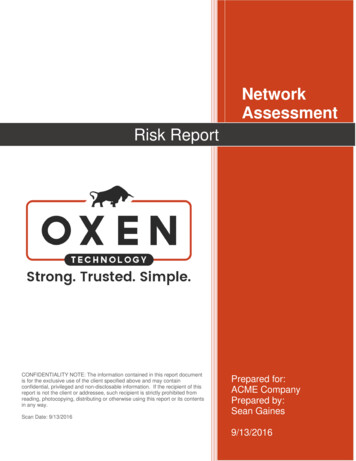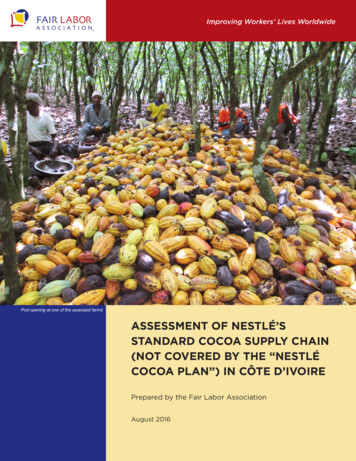
Transcription
Improving Workers’ Lives WorldwidePod opening at one of the assessed farmsASSESSMENT OF NESTLÉ’SSTANDARD COCOA SUPPLY CHAIN(NOT COVERED BY THE “NESTLÉCOCOA PLAN”) IN CÔTE D’IVOIREPrepared by the Fair Labor AssociationAugust 2016
ASSESSMENT OF NESTLÉ’S STANDARD COCOA SUPPLY CHAIN IN CÔTE D’IVOIRETABLE OF CONTENTSI.EXECUTIVE SUMMARY.3II.INTRODUCTION.5III. BACKGROUND.6a. About Nestlé Standard Supply Chain Assessment.6b. Supply Chain Management System at Tier 1 Supplier viz à viz Assessed Traitant.8IV. METHODOLOGY.9a. Assessment Team.9b. Sample Selection.9c. Data Collection and Tools Used. 11d. Assessment Stages. 12e. External Information Gathering. 13V. FINDINGS. 13a. Traitant’s Supply Chain Mapping. 13b. Traitant’s Supply Chain Actors. 15c. Cocoa Bean Procurement and Transportation in Traitant’s Supply Chain. 19d. Farm Profile of the Assessed Farms. 20e. Risks Assessment of the Internal Management System at the Traitant Level. 201.Presence, Content and Visibility of Policies.212.Implementation, Training and Internal Monitoring.223.Resource Allocation.234.Indicators and Results.23f. Labor Risk Assessment. 251.Employment Relationship.252.Forced Labor. 263.Child Labor. 264.Harassment and Abuse (H&A). 285.Non-Discrimination. 286.Health, Safety and Environment. 297.Freedom of Association and Collective Bargaining. 308.Hours of Work. 309.Compensation. 31VI. CONCLUSIONS.32VII. RECOMMENDATIONS.33a. Improvements in the Internal Management System. 33b. Improvements at the community and farm level to foster labor standards compliance. 35ANNEX 1.37ANNEX 2.38COMMUNITY PROFILES (4).38www.fairlabor.org1
ASSESSMENT OF NESTLÉ’S STANDARD COCOA SUPPLY CHAIN IN CÔTE D’IVOIRETABLE OF ACRONYMSASA.Afrique Secours AssistanceCCC.Coffee and Cocoa CouncilCOC.Code of ConductCPT.Community Profiling ToolFEMAD.Femme Action DéveloppementFLA.Fair Labor AssociationFT.Fair TradeGAI.Grower’s Assessment InstrumentGAP.Good Agriculture PracticesGBCC .Global Business Consulting CompanyHSE.Health Safety and EnvironmentILO.International Labor OrganizationIMS.Internal Management SystemIMST.Internal Monitoring System ToolIPEC.International Program on the Elimination of Child LaborMoU.Memorandum of UnderstandingNCP.Nestlé Cocoa PlanNGO.Non-Governmental OrganizationPR.Producers RelayRA/RFA.Rainforest AllianceSACO.Société Africaine de CacaoSERAP.Socially and Environmentally Responsible Agricultural PracticesSMT.Supply Chain Mapping ToolSTCP.Sustainable Tree Crop ProgramsUNICEF.United Nations Children’s FundUTZ.Utz Certifiedwww.fairlabor.org2
ASSESSMENT OF NESTLÉ’S STANDARD COCOA SUPPLY CHAIN IN CÔTE D’IVOIREI. EXECUTIVE SUMMARYSince 2012, the FLA has assessed workingconditions at farms in Côte d’Ivoire producingcocoa for Nestlé under the company’s “NestléCocoa Plan.” This sustainability initiativefocuses on the 20 percent of the company’scocoa supply chain in which Nestlé workscollaboratively with its tier-1 suppliers tomaintain visibility into labor standards at thesuppliers’ farms and enact its commitment tothe FLA Workplace Code of Conduct.1For the great majority of Nestlé’s cocoaprocurement, the company maintains nodirect relationships with farmers, and relies ona network of intermediaries to secure accessto the cocoa used in the company’s products.For this assessment of Nestlé’s “standardsupply chain,” the FLA worked with one ofthe company’s tier-1 suppliers to identify anappropriate tier-2 supplier (also known asa “traitant”) for an assessment of workingconditions at farms outside of the “NestléCocoa Plan.”Assessors visited farms in four communities,interviewing a total of 110 farmers and 322 farmworkers, along with staff at both the tier-1 andtier-2 suppliers, and a number of additionalintermediaries, such as truck drivers, warehouseworkers, and others. The body of this reportdescribes the structure of the supply chain theyencountered, and the working conditions at thefarms at the end of the supply chain.Labor Standards Outside the“Nestlé Cocoa Plan”When FLA assessors visit farms producingcocoa for the “Nestlé Cocoa Plan,” theyassess working conditions against nine broadcategories outlined by the FLA WorkplaceCode of Conduct2 , which has been adopted1 sible-sourcing/nestle-cocoa-plan2 ww.fairlabor.orgby Nestlé. This Code of Conduct forbidschild labor and forced labor, articulates anumber of health and safety standards, andrequires reasonable hours of work and faircompensation, among other provisions. WhileNestlé’s adoption of this Code of Conductobligates its implementation throughout thecompany’s supply chain, FLA assessors foundlittle awareness of this code and its provisionsamong the farmers and farm workers of the“standard supply chain.”Assessors did find that some of the farmssupplying to the tier-2 supplier had achieveda third-party sustainability certification fortheir cocoa from either Utz3 or the RainforestAlliance4. To achieve these certifications,farmers must be trained on the certifyingbody’s Code of Conduct (which is similar,but not identical, to the Nestlé Code ofConduct), and implement the certifyingbody’s sustainability requirements at the farmlevel. Assessors found sustainability trainingand some sustainability monitoring amongthe 30 percent of farms that both producefor the tier-2 supplier and have also achievedcertification. The tier-2 supplier maintainsstaff responsible for training these producerson the labor and environmental standardsthey must meet to earn certification, and formonitoring their compliance in preparationfor assessment by the certification body.For the 70 percent of farms outside of anycertification program, however, FLA assessorsfound no evidence of any training on thelabor standards articulated by Nestlé’s Codeof Conduct, or any monitoring to ensure thatworking conditions meet Nestlé’s standards.The assessment team reports that in additionto the lack of monitoring and remediationsystems, they found labor-rights issues thatmirror those sometimes found on Nestlé3 https://www.utz.org/4 http://www.rainforest-alliance.org3
ASSESSMENT OF NESTLÉ’S STANDARD COCOA SUPPLY CHAIN IN CÔTE D’IVOIRECocoa Plan farms (which do have monitoringand remediation in place), such as child labor,health and safety issues, a lack of effectivegrievance procedures, and forced labor risks.Supply Chain Traceability and InternalManagement ImprovementsDespite the many actors involved in the“standard supply chain,” FLA assessors foundthat the systems and information necessaryto fully trace this part of the supply chain doexist. Because of the need to track the cocoacoming from farms involved in certificationprograms, and to provide training at thesefarms, assessors found that the tier-2 suppliermaintains traceability mechanisms that couldbe leveraged for non-certified farms as well.Assessors also found that while the tier-2supplier does not maintain documentationon the non-certified farms in the supplychain, this information could be obtained.The tier-2 supplier works with a number ofintermediaries known as “pisteurs” (“trackers”in English) who maintain records on thefarms where they collect cocoa beans. Theassessors note that while many pisteurs arereluctant to share their information, if supplychain stakeholders could work together tocombine the pisteurs’ records with the tier2 traceability system, it would be a first steptoward organizing and better implementinglabor standards across this part of the“standard supply chain.”The FLA recommends that Nestlé work withits tier-1 and tier-2 suppliers to introduce anelectronic registration system of all supplierfarms, based on the data currently maintainedby the pisteurs. With this infrastructure inplace, then, the FLA recommends that Nestléand its suppliers develop a five-year planto bring both internal labor monitoring andremediation of violations to the 70 percentof the supply chain not currently coveredwww.fairlabor.orgby a certification standard. This work wouldrequire support from Nestlé to distribute itsillustrated Code of Conduct to the standardsupply chain, expand the labor-standardstraining and monitoring functions performedby the tier-2 supplier, and strengthen farmers’contractual relationships to incorporate laborstandards.Farm and Community Level ImprovementsFinally, the FLA recommends that Nestle andits tier-1 and tier-2 suppliers work together tomake needed improvements at supplier farmsand communities that will improve the qualityof life for farmers and workers and improveworking conditions at the farms. For example,FLA assessors identified that many farmerscould increase their yields and thereforetheir incomes with some simp
ASSESSMENT OF NESTLÉ’S STANDARD COCOA SUPPLY CHAIN (NOT COVERED BY THE “NESTLÉ COCOA PLAN”) IN CÔTE D’IVOIRE. Prepared by the Fair Labor Association. August 2016. Pod opening at one of the assessed farms. www.fairlabor.org1. TABLE OF CONTENTS. I. EXECUTIVE SUMMARY .
